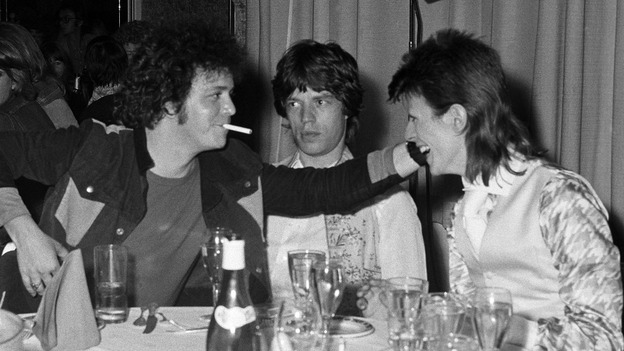Despite how despondent I – along with millions of others – was to hear the news of David Bowie’s passing after a concealed 18 month battle with cancer, this article is largely not about him. I cannot say that his death has had the same impact on me as it has some of my friends, particularly those to whom he was more than his music – a queer icon to be admired for his limitless eccentricity and adaptability. Struck though I was to hear of the death of a musical giant – Hunky Dory being one of my favourite albums of all time, and his latest album had been playing in my room more or less on repeat since its release – I was reminded of how I had felt when I heard of the passing of another musician, one I still totally idolise, back in 2013. A colleague, contemporary, and occasionally a friend to Bowie: Lou Reed.
Lou Reed didn’t get to end his career on a musical swan song like Blackstar – something of a tragedy when you consider that his decades of work – a totally prolific 55 years of music – was topped off by the heartily mediocre (if not dogshit) collaboration with Metallica, Lulu. Where everything about Blackstar radiates a sense of maturity and mortality – from the disturbing bedridden music video for the album’s second single ‘Lazarus’ to the foreboding, anti-pop instrumentals – Lulu is almost a cheap imitation of what made Reed such an appealing figure musically, his trademark gristle still present, but without any of the poetry that made him such an inspiring figure to the musically minded. Listening to Blackstar after learning of David Bowie’s death was sad, but not the same kind of sadness, bordering on disappointment, prompted by my (very) occasional listens to Lulu. Blackstar will always be a reminder of what a remarkable talent Bowie was, and how unfortunate it is that he was taken from us at a comparatively young age. Lulu makes me bitter. Far from the dizzying heights of the Velvet Underground or his illustrious solo career, including the beautiful Songs for Drella, Lulu is Reed at his worst – uninspired, uninspiring and unlistenable. Every time I listen to it, I want it to be a much better album than it actually is.
But when I think about what makes Bowie’s passing especially tragic to millions of fans – his death representing not only the death of one of Britain’s greatest musicians, but also one of its biggest personalities, I find it a lot easier to contextualise Lulu amidst the backdrop of Reed as a person, rather than a musician. Reed simply did not give a single shit what people thought about him, be they his admirers, his contemporaries, or his friends. About Lulu, Reed is quoted as saying – “I don’t have any fans left. After Metal Machine Music, they all fled. Who cares? I’m essentially in this for the fun of it.”
Reed made great music. I’ll play The Velvet Underground to my kids one day, and his best music – particularly his work with John Cale, will always rank amongst my favourites. He shares the same jarring poetic expression as many of my other musical heroes – Cave, Cohen and Byrne to name a few. No matter what I go on to do with my life, however successful or otherwise I might be, I will always compare myself unfavourably with the 22 year old Lou who wrote Heroin, one of the most abrasively wonderful songs I’ve ever heard, and the song that got me hooked on the Velvet Underground (but thankfully not heroin). But I don’t think it was just his music that made such a mark on me; something I tend to forget.
Lulu leaves a bad taste in my mouth, almost bordering on resentment, when I know it really shouldn’t. Blackstar was a continuation of what Bowie had been doing for the past 50 or so years – evolving. Lulu was a continuation of what Reed had been doing for the last 50 or so years – not giving a shit. Reed and Bowie had a lot in common, not least of which was an intense edginess – not in the Linkin Park sense of the word, but in a really punkish and evolutionary combination of art and personality in creating something much larger than the sum of their respective discographies.
Reed’s music isn’t the reason he lives on in people’s idolisation of him, nor will Bowie’s passing necessarily be characterised by a memorial of his music by legions of fans. What makes these two figures so unique is the reconciliation of art with personality – Bowie the eternal chameleon, Reed the careless renegade. Reed’s death hit the 16-year-old me in the same way that Bowie’s is going to hit any number of weird, outsider high-schoolers struggling to find a concrete identity.
I’m still not going to listen to Lulu with anything other than total contempt. It still sounds like shit. Nor am I going to profess to be any more of a David Bowie fan than I actually am. I am however, with the passing of each veritable artistic colossus, becoming more and more aware of how the memories of great individuals can be preserved in the hearts of the people that admired them. I hope diehard Bowie fans everywhere will bombard their unwitting kids with the music that served to define them, just as I will play a seven and a half minute long song about hard drugs to my unborn child. They will live on through our experiences, and in the way that their music, personality and impact helped mould us into the people we are today.
Words by Hugh Hutchison

